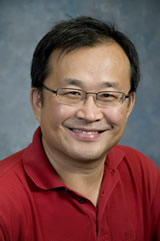Professor’s data mining research stands ‘Test of Time’
A UALR Department of Information Science professor has received a prestigious “Test of Time Award” in recognition of the groundbreaking research he conducted nearly 20 years ago.
Dr. Xiaowei Xu’s research was originally published for Knowledge Discovery from Databases (KDD), a leading international forum for data science, data mining, knowledge discovery, large-scale data analytics, and big data.
The KDD community recently formed a committee to consider nominees for the first “Test of Time Award” in recognition of research with lasting impact. The committee reviewed all KDD conference papers published between 1995 and 2004.
Xu is being honored at the sold-out 2014 KDD Conference in New York City this week, Aug. 24-27, in which a record-breaking 2,200 people are in attendance, and where he is joined by only two other recipients of the award.
Xu’s paper, “A Density-Based Algorithm for Discovering Clusters in Large Spatial Databases with Noise,” proposed a new algorithm for strategically mining large amounts of data.
It was first published in 1996, but the theories contained within it still have practical applications today.
The paper introduced density-based clustering to the data mining community using the now well-known algorithm, DBSCAN. In the years since it was first brought to public attention, the algorithm has been featured in numerous textbooks and cited by thousands of researchers.
“This award speaks to Dr. Xu’s incredible analytic talent,” said Liz Pierce, UALR information science chairperson. “It adds to the prestige of our program, and it is an inspiration for our students to have someone of his caliber as a research mentor.”
Xu received a doctorate in computer science from the University of Munich in Germany and a master’s degree from the Shenyang Institute of Computing Technology of the Chinese Academy of Sciences in Shenyang, China. He received a bachelor of science in mathematics from Nankai University in Tianjin, China.
Visit the UALR Department of Information Science for more information.
Keep up with what’s happening; Subscribe to UALR Now.
